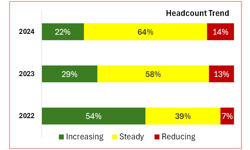The argument began in the advertisement department and threatened to go on for a long time.
Our ad director and her team were going to sell subscriptions at an exhibition. But she didn’t like the leaflets I had created:
"People won’t have time to read all this!" she told me. "It’s too long. All we need is an A4 sheet with a coupon and a copy of the magazine to show what they get."
As the copywriter responsible for selling subscriptions, the comment was directed at me. I had given the sales team a big box of four-page leaflets listing all the benefits of our magazine. And to be fair, she had a point - it did go on a bit. There were bullet points, sub heads, boxed text, pictures of three free gifts with long descriptions for each, headlines in a garish red, a picture of a typical reader, lots of testimonials and a guarantee in an eye-catching box next to the free trial coupon; plus lots and lots of copy.
So – who would read all that?
How would I explain why four pages are better than one? And eight pages are better than four? I had to be very careful with my answer because our ad director had a forensic approach for assembling an argument and could carry on a cross-examination for easily half an hour. As she was the one who was going to be doing the selling, she wanted evidence. So I told her:
"Long copy has been tried in most markets and works better than short copy."
The exhibition went well and we sold more than a hundred subscriptions.
No time to read – but no time to talk either
At an exhibition, you have a limited number of colleagues staffing your stand. Our team could have handed out single A4 sheets, but a short piece of copy couldn’t cover all the benefits of a subscription. Those colleagues would have become tied up answering the many questions a person asks before parting with their cash. Freeing the ad sales people to sell ads was necessary to maximise revenue from exhibitors.
On the day, visitors picked up the four-page leaflet because the heading promised a free trial. It was linked to a ‘bill me’ coupon. All the person had to do was write in his or her name and address and he would be given one of the free gifts there and then. The invoice would come later.
But let’s go back to the ad director (let’s call her Muriel), because her point is worth examining further. It was a natural reaction for Muriel, and probably you, to look at that long letter and refuse to believe that anyone would read it all. And you’d be right.
Greed and fear - how a ‘long letter’ started a war
A long letter is generally defined as having from four to thirty-two pages (or more). What dictates the letter’s length is not what you think the reader will read, it’s how many benefits can be included about your publication, product, service or idea.
This applies to all markets, not just publishing. Benefits are linked to two primary human motivators: greed and fear. They can be expressed as:
* What’s in it for me?
* What happens if I don’t respond?
Those two motivators can get people to agree to almost anything - even, as any politician will tell you, the idea of going to war. Here’s a recent example:
The Commons vote in March 2003 to go to war in Iraq followed a long speech by the Prime Minister. The speech was reprinted in many newspapers. It contained nothing remotely substantial, no hard evidence. As we discovered later, there was none. But the speech did contain a hint that the Prime Minister would resign if he didn’t get the vote to go to war:
"Tell our allies that at the very moment of action .. that Britain faltered? I will not be party to such a course."
As you may remember, Blair got the vote, by a majority of 263. And off our boys went to war.
How the target audience – us – responded
But what affect did his speech have on the wider target audience – us? Remember, it is important to get the population on side for a war. Here are the response figures:
Before: two weeks before the speech, a nationwide poll found just 36% approved of the Prime Minister’s handling of the Iraq situation.
After: two weeks after the speech, 47% approved.
That nine-page message swung the opinion of a country. It was masterful copy, as you can read at www.wizardwordz.com/articles/Blair-speech-Iraq
Blair writes his copy himself and those nine pages had a lot of convincing to do. Unlike most direct marketing letters, his message did not offer benefits. And he had to deal with some big objections: hardship, death and billions of pounds of expenditure. To overcome those objections his message centred on decisive action and that other, most powerful motivator, fear: fear of a wider war, fear that Britain would lose a friend (America) and fear that we would lose our (then popular) Prime Minister.
How many people read the whole speech? I would guess very few. But in just two weeks it brought in an extra 11 points, which meant a decisive number of people agreed with the general idea that Britain should take military action.
For a publisher, that kind of swing would bring an avalanche of new orders and congratulations all around for the marketing department.
But the puzzle remains: if almost no one read that nine-page speech, how did it work?
Your words are read by those who matter
The principle behind the long message is that the more benefits you include, the better. And you must list them all, whether communicating by speech, by internet or direct mail.
Readers won’t read all the words, but they scan your message and gain an impression. The longer the letter, the more positive they feel. The impression is that a great deal more is being offered.
This is where creativity meets the science of direct marketing. Your personal opinion on why you will not read a long letter is not relevant because it won’t stand up to scientific scrutiny. We are writing for that small percentage of people who will place an order and it’s folly to guess what goes on in their minds!
The poll about approval of the Prime Minister’s handling of the Iraq situation was among 900 people. That’s the minimum number you need to make a statistically reliable example. Your one vote doesn’t count.
What about your own publication?
A person who is interested in your publication’s subject matter will read all about it.
Publishers have no qualms about running sixty-four or ninety-six pages in a magazine. Articles can be anything from two, four and six pages upwards. As your editor will tell you, readers need to be informed and the subject sufficiently covered.
Sounds logical, doesn’t it? And it is. However that principle almost certainly won’t be applied in your direct marketing efforts. And why is that? Why does that logic falter when it comes to writing copy and selling information products?
The reason so many senior publishing people think long letters are not read and therefore won’t work is because they have not seen the extra revenue a long-letter brings in. The other problem is there may not be anyone on the staff who can write that kind of benefit-laden copy.
By including all the benefits, your message is more convincing. Leave a benefit out and response drops. That logic applies to all publishing: leaving interesting stuff out is like cutting pages from your publication’s editorial features. Although few readers read every word of every issue, your readership would plummet.
Is long copy difficult to write?
If you look at an effective long letter, the task may appear daunting. It takes an expert around five days to write and there are many rules, devices and tricks to creating a really effective ‘hot letter’. But if there is one thing that I have found in my years of writing long-copy promotions it’s this:
Writing effective copy can be a very easy job because I often find the benefits of the product have been disguised or overlooked by the people who market it - a major failing for business people who are ‘too close’ to their product. They just cannot see how others might see it.
I asked Drayton Bird, the UK’s best-known direct-marketing copywriter and author of the essential work Commonsense Direct Marketing for his thoughts. This is his response:
"I have found repeatedly that this is true. If you analyse the business of copywriting, it is the process of getting people better results from their communications – and nine times out of ten that failing described above applies."
The reason publishers, and most company owners, don’t communicate their product’s benefits to full advantage is because they look at their business from a perspective of service and profit.
Readers, clients and customers, however, look at how the product will affect their lives - an entirely different perspective. Successful companies grow because they understand the need to communicate benefits and convince as many people as possible about them. They set up their sales and marketing operation accordingly. That is why, in almost every case, they employ direct marketing experts.
The copywriter, sniffing around the product with the 360 degrees view of a consumer, sees how to tap into the customers’ wants, expectations and doubts. It’s his independent, sceptical eye that can exploit people’s emotions and obtain a sale.
Why small businesses (like mine) remain small
Of the company owners who approach me for advice, I can spot right away those who are destined to grow and those who will stay small. The no-growers don’t see the importance of effective marketing. If at all, it’s added on as an afterthought.
The reason given is always the same: "It costs too much." Those who have read this far will know reverse logic of that nature is what divides the failures from the big boys.
Although I am sad those little companies are destined to eventually die, I find it very difficult to tell them why their logic is flawed. The owner thinks I am just trying to get work out of him.
In that respect, I have failed to overcome the prospect’s main objection to investing in proper marketing. And that failure is why mine, like theirs, will remain a small business.
FEATURE
How to use greed and fear
What are the response triggers? What in your copy will prompt your prospect to take up your offer? Peter Hobday reveals how to motivate prospects and how a well crafted ‘long letter’ can even send us to war.










